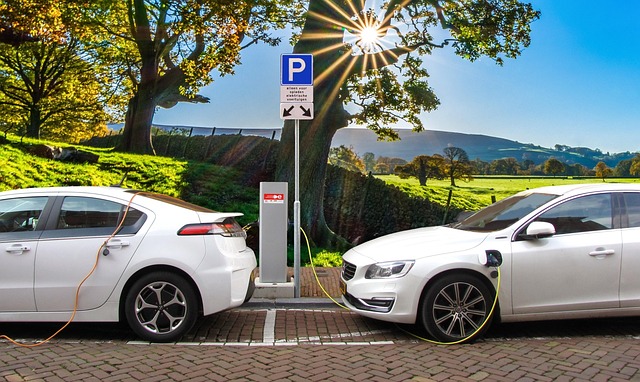Many drivers are turning to hybrids to save money on taxes and reduce their environmental impact. These vehicles combine electric motors, batteries, and smaller gasoline engines for improved fuel efficiency, lower emissions, and potential tax breaks. When choosing a hybrid, consider designs (series or parallel) and models tailored to your needs and budget, from compact sedans to luxury cars. Global brands offer diverse options with incentives, making hybrids cost-effective and environmentally friendly choices. Government incentives further reduce upfront costs, encouraging a shift towards fuel-efficient vehicles and lowering carbon footprints.
“Discover how select hybrid cars can significantly reduce your tax burden while saving on fuel. This article demystifies the tax benefits of hybrid vehicles, detailing how their unique technology minimizes environmental impact and translates to financial savings. From understanding key tax advantages to choosing the right model and exploring available incentives and credits, we’ll guide you through the process. Learn about the long-term financial advantages of owning a hybrid car, making an informed decision for both your wallet and the planet.”
- Understanding Tax Benefits for Hybrid Vehicles
- How Hybrids Reduce Fuel Costs
- The Environmental Impact and Its Tax Implications
- Choosing the Right Hybrid Model for Tax Savings
- Incentives and Credits to Consider
- Long-Term Financial Advantages of Owning a Hybrid Car
Understanding Tax Benefits for Hybrid Vehicles

Many drivers are turning to hybrids as a way to save on taxes and reduce their environmental impact. To understand the tax benefits, it’s essential to grasp how hybrid vehicles operate. Unlike traditional cars that rely solely on gasoline, hybrids incorporate an electric motor and battery system, known as a hybrid drive train, which allows for more efficient fuel use. This means lower fuel consumption and emissions, translating into potential tax savings.
When selecting a hybrid car, consider the various types available in the market. From series hybrid vehicles that primarily use electricity with a small gasoline engine for occasional power assistance to parallel hybrids that can switch between electric and gas power seamlessly, each design offers unique advantages. Top-selling hybrid brands globally have pioneered these technologies, providing drivers with efficient and cost-effective transportation options while contributing to a more sustainable future.
How Hybrids Reduce Fuel Costs

Selecting a hybrid car can significantly reduce your fuel costs, making it an attractive option for eco-conscious and cost-saving drivers. Hybrids combine a conventional internal combustion engine with an electric motor, allowing them to operate efficiently in various conditions. When driving at constant speeds or during stop-and-go city traffic, the electric motor takes over, eliminating fuel consumption. This feature is particularly advantageous for those commuting daily, as it minimizes expenses at the pump.
Moreover, hybrid car incentives and rebates are widely available, further reducing the upfront cost of these vehicles. The high-performance hybrid sports cars on the market offer thrilling driving experiences without compromising fuel efficiency. Additionally, hybrid vehicles with excellent fuel economy have become increasingly popular, providing drivers with a range of options to choose from, including compact sedans, SUVs, and even luxury models, all while ensuring remarkable savings at the pump.
The Environmental Impact and Its Tax Implications

The environmental benefits of hybrids extend far beyond reduced emissions. Select Hybrid Cars that offer a hybrid powertrain technology explained allow for more fuel-efficient driving, meaning less reliance on fossil fuels. This not only helps to combat climate change but also has direct tax implications. Many governments offer enticing tax incentives for purchasing cheap hybrid cars near me, recognizing the positive impact these vehicles have on both the environment and public finances. By encouraging a shift towards hybrid cars with all-wheel drive, nations can mitigate environmental damage and potentially reduce their carbon footprint.
The savings don’t stop at individual drivers. On a larger scale, reduced fuel consumption translates to decreased demand for oil, which can lower overall energy costs. This collective impact can lead to substantial tax savings for governments, freeing up resources for other public services. Recognizing the dual benefits of hybrid cars with all-wheel drive—both ecological and economic—is crucial in making informed decisions about personal vehicle choices and policy support.
Choosing the Right Hybrid Model for Tax Savings

When considering tax savings with hybrids, it’s crucial to select the right model that aligns with your needs and budget. Not all hybrid cars are created equal, so understanding the differences between various types is key. For instance, long-range hybrid cars offer not only fuel efficiency but also extended electric driving ranges, potentially reducing overall costs. Alternatively, series hybrid vehicle advantages include a smoother transition between gas and electric power, making them ideal for urban commuting.
When choosing, factor in your daily commute distance and driving style. If you primarily cover long distances, a hybrid SUV option might be more suitable due to its combination of passenger space and fuel economy. Conversely, if your journeys are mostly short, a smaller, more efficient hybrid could be the better financial choice. Remember, selecting the right select hybrid cars is half the battle; maximizing tax benefits requires an informed decision based on your specific circumstances.
Incentives and Credits to Consider

When considering select hybrid cars, it’s crucial to understand the various incentives and credits available to help offset the initial cost. Many governments offer attractive tax breaks and rebates for purchasing eco-friendly vehicles, such as hybrids. These incentives can significantly reduce the financial burden of owning a hybrid, making them a more affordable option than ever before. For instance, some states provide direct rebates on purchase prices, while others offer reduced registration fees or exemption from certain taxes.
In the hybrid vs. electric cars comparison, hybrid vehicles stand out due to their fuel efficiency and lower emissions. A key advantage lies in their parallel hybrid system, where both a conventional engine and an electric motor work together to improve performance and conserve fuel. This technology is particularly notable in best hybrid sedans under $30k, offering drivers a practical and cost-effective way to reduce their environmental impact.
Long-Term Financial Advantages of Owning a Hybrid Car

Investing in a hybrid vehicle is not just an environmentally conscious choice; it offers significant long-term financial advantages that can save you money over time. One of the key benefits is the potential for substantial tax savings. Many governments offer incentives and deductions for purchasing eco-friendly alternatives to gas guzzlers, making hybrids an attractive option. These incentives can include reduced registration fees, rebates on purchase, or even tax credits, which vary depending on your location.
Additionally, hybrid cars are known for their superior fuel efficiency, which translates to lower running costs. The longevity of hybrid car batteries is another advantage; these batteries typically have a longer lifespan than traditional internal combustion engines, reducing the need for frequent replacements and further saving you money in the long run. By choosing a select hybrid car for sale, you’re not just opting for a greener mode of transport but also securing financial stability and potential cost savings in the years to come.
When considering a Select Hybrid Car, the financial benefits are clear. By understanding the tax advantages, fuel savings, and environmental impact, you can make an informed decision that not only saves on taxes but also contributes to a greener future. With various incentives and credits available, owning a hybrid offers long-term financial advantages that go beyond the immediate purchase cost. Embrace the shift towards sustainable transportation and reap the rewards.
